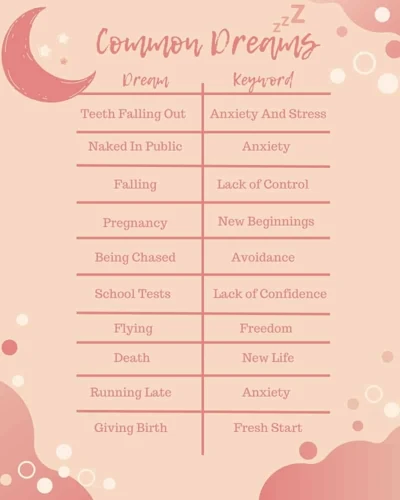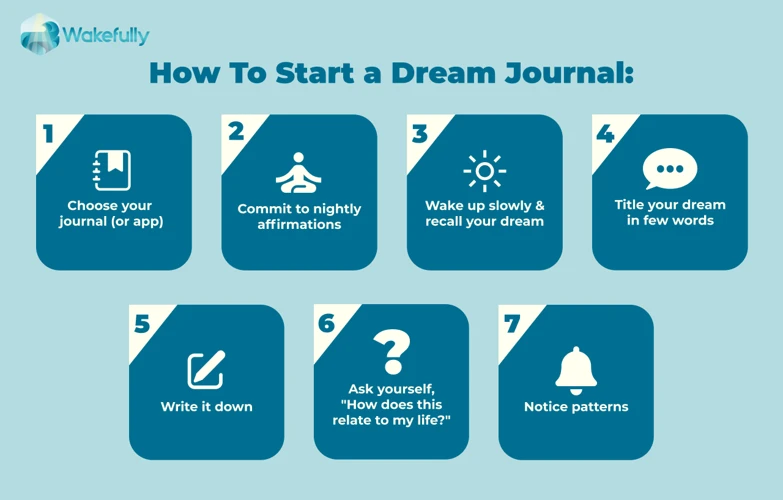The Importance of Dream Symbols

Dreams have always been a subject of fascination for humans. They are often seen as a gateway to our subconscious, a place where we can explore the depths of our minds and emotions. One of the most important aspects of dreams is the symbols that appear in them. Dream symbols are images or objects that represent something else and they can provide a wealth of information about the dreamer’s thoughts, emotions, and experiences.
Understanding dream symbols is important because they can help us to uncover hidden truths about ourselves. Dreams are often a reflection of our subconscious mind, which means that they can reveal things that we may not be aware of in our waking life. By analyzing the symbols that appear in our dreams, we can gain insight into our deepest desires, fears, and motivations.
One way to start exploring dream symbols is by keeping a dream journal. This involves recording your dreams as soon as you wake up and making note of the symbols that appear in them. As you continue to track your dreams over time, you may start to notice patterns or recurring symbols. This can provide even more insight into the messages that your subconscious is trying to communicate to you.
Another reason why dream symbols are important is that they can be used for personal growth and self-discovery. By analyzing these symbols and the emotions they evoke, we can identify areas of our lives that we may need to work on or explore further. For example, if you continuously dream about being chased, it may suggest that you are running away from something in your waking life. By reflecting on the emotions and circumstances surrounding this symbol, you can gain a deeper understanding of what that something might be.
In order to make the most of dream symbols for personal growth, it’s important to know how to interpret them correctly. This involves using techniques such as free association, examining the context of the dream, and paying attention to emotions. By taking the time to understand and reflect on the symbols that appear in your dreams, you can unlock the secrets of your subconscious mind and use this knowledge to improve your life.
If you’re interested in exploring dream symbols through journaling, there are many resources available to help you get started. You can find tips and advice on effective dream journaling, interpreting dreams, and even using dreams to improve your mental health. With the right mindset and tools, dream journaling can be a powerful tool for personal growth and self-discovery.
Interpreting dream symbols through journaling is an incredibly valuable tool, that can provide a wealth of knowledge about our subconscious mind. Through analyzing and understanding these symbols, we can gain insight and knowledge about ourselves that can help us grow and develop in meaningful ways.
Getting Started with Dream Journaling

Dream journaling can be an incredibly powerful tool for unlocking the secrets of your subconscious mind. By recording your dreams and reflecting on their symbols and meanings, you can gain insight into your deepest thoughts, fears, desires, and emotions. But if you’re new to dream journaling, you might be wondering where to start. There are several important factors to consider when getting started with dream journaling, such as the basics of recording your dreams, the types of dreams to look out for, and how to interpret dream symbols. To learn more about these foundational elements of dream journaling, keep reading. And if you’re interested in exploring other aspects of dream journaling, such as lucid dreaming or tracking dream patterns, be sure to check out our other articles on effective dream journaling tips, lucid dream journaling, tracking dream patterns through journaling, and dream journaling for mental health.
The Basics
When starting a dream journal, it’s important to establish some basic guidelines to follow. These guidelines will help you develop a consistent practice of recording and reflecting on your dreams. Here are some of the basics to keep in mind:
| Select a Dream Journal | Choose a notebook or journal dedicated solely to recording your dreams. This will make it easier to keep track of your progress, and provides a special place to reflect on your experiences. |
| Record Every Dream | Even if a dream seems unimportant or confusing, write it down. Every detail can hold meaning. Use descriptive language, and try to recall everything you can about the dream. |
| Include Dates and Titles | Record the date of each dream, along with a title that summarizes its main theme or content. This makes it easier to find and reflect on specific dreams later on. |
| Reflect and Interpret | Take time to reflect on each dream you record. Consider what emotions were present, what symbols stood out, and what the overall message may have been. Interpretation may not come immediately, but reviewing dreams over time can reveal deeper insights. |
| Make it a Habit | The more consistently you record your dreams, the more insights you’ll gain from the practice. Make it a habit to record your dreams before getting out of bed each morning, or before going to sleep each night. |
By following these basic guidelines, you’ll be able to establish a consistent practice of dream journaling. Recording your dreams is just the first step in unlocking the secrets of your subconscious. From here, you can begin to dig deeper into the meanings behind your dreams and start to uncover hidden insights and truths about yourself and your life.
Types of Dreams to Look Out For
When it comes to dream journaling, it’s important to be aware of the different types of dreams you may experience. Being able to identify and categorize your dreams can help you better understand their significance and meaning. Here are some common types of dreams to look out for:
| Nightmares | Lucid Dreams | Recurring Dreams |
|---|---|---|
| Nightmares are unsettling and often terrifying dreams that can leave you feeling anxious or frightened upon waking. They may be a result of stress, trauma, or other underlying issues. | Lucid dreams are when you become aware that you are dreaming while you are still in the dream. This can give you a sense of control over the dream and allow you to manipulate the dream environment. | Recurring dreams are dreams that repeat themselves over time. They may be a sign of unresolved issues or deep-seated anxieties that need to be addressed. |
| Prophetic Dreams | False Awakening Dreams | Sleep Paralysis Dreams |
| Prophetic dreams are dreams that seem to foretell future events. They may be symbolic or literal in nature and can be difficult to interpret. | False awakening dreams are dreams in which you believe you have woken up, only to realize that you are still dreaming. These dreams can be disorienting and confusing. | Sleep paralysis dreams are often accompanied by a feeling of being unable to move or speak. They can be terrifying and may be linked to underlying sleep disorders. |
By being able to identify the type of dream you are having, you can begin to unravel its meaning and unlock the secrets of your subconscious mind. Keep in mind that not all dreams may fit neatly into these categories, and it’s possible to experience a combination of different types of dreams.
Interpreting Dream Symbols

As we delve deeper into the world of dream journaling, one of the most fascinating aspects is the possibility of interpreting dream symbols. Every image, person, and object that appears in our dreams can hold multiple layers of meaning and significance. However, the interpretation process can feel overwhelming and confusing. How do we begin to understand the messages our subconscious is sending us? In this section, we will explore some techniques for interpreting dream symbols and uncovering their hidden meanings.
Using Free Association to Unlock Meaning
One approach to interpreting dream symbols is to use a technique called free association. This involves thinking of the first thing that comes to mind when you see a particular symbol, and then exploring the connections and associations between that and other ideas or feelings. To use this technique, follow the steps below:
| Step 1: | Choose a dream symbol that stands out to you. |
| Step 2: | Write down the symbol in your dream journal. |
| Step 3: | Take a few deep breaths to calm your mind. |
| Step 4: | Write down the first word or phrase that comes to mind when you think of that symbol. |
| Step 5: | Write down any other words or phrases that come to mind in relation to the first word. |
| Step 6: | Continue this process for as long as you like, exploring any connections or emotions that come up. |
| Step 7: | Reflect on the associations you have made and consider how they might relate to your waking life. |
By using free association, you can explore the deeper layers of meaning behind a dream symbol and gain insights into your subconscious thoughts and feelings. It’s important to keep an open mind and not judge any associations that come up – even if they seem trivial or unrelated at first. Connecting seemingly unrelated ideas can often reveal surprising insights and help us better understand ourselves.
The Role of Context in Understanding Symbols
The role of context in understanding dream symbols is crucial in unlocking their hidden meanings. A symbol in a dream can have multiple interpretations depending on the context in which it appears. Context refers to the specific circumstances or surroundings in which a symbol occurs in a dream, including other symbols that may be present, the actions and emotions of the dreamer, and the overall mood of the dream. Here are some examples:
| Symbol | Possible Interpretation Without Context | Possible Interpretation Considering Context |
|---|---|---|
| Spider | A symbol of fear or danger | If the spider is spinning a web, it could symbolize creativity or manifestation. If the spider is crawling on the dreamer, it could represent feeling trapped or invaded. |
| Door | A symbol of opportunity or entry | If the door is locked, it could represent barriers or obstacles. If the dreamer is unable to open the door, it could symbolize feeling stuck or unable to move forward. |
| Water | A symbol of emotions or cleansing | If the water is calm and peaceful, it could represent serenity or tranquility. If the water is turbulent or stormy, it could symbolize emotional turmoil or instability. |
As seen in the table, symbols in dreams can have very different meanings based on the context in which they appear. When interpreting dream symbols, it’s important to consider the context they appear in and not just rely on general interpretations. Paying attention to details, including other symbols and the overall mood of the dream, can help provide insight into the message the dream is trying to convey.
The Importance of Emotions in Interpreting Dreams
When it comes to interpreting dream symbols, it’s important to pay attention to the emotions you experienced during the dream. Dreams are not just a series of images and actions; they also carry with them a range of emotions that can provide insight into your subconscious mind.
Here are a few reasons why emotions are important in interpreting dreams:
- Emotions highlight what’s important: The emotions you feel during a dream can give you clues about what your subconscious is trying to draw your attention to. For example, if you feel happy and joyful during a dream, it could be a sign that you’re on the right path in your waking life. Alternatively, if you feel anxious or scared, it could be a warning sign that you need to address a situation or relationship.
- Emotions add context to dream symbols: Emotions can give context and meaning to dream symbols, helping to unlock their true significance. For example, if you dream about a snake and feel fearful, it could indicate that you’re afraid of change or that there’s something in your life that you’re afraid to confront.
- Emotions connect dreams to waking life: Dreams are not isolated events; they are often connected to the emotions and experiences of your waking life. By paying attention to the emotions you feel during a dream, you can begin to uncover how your subconscious is processing and responding to the events and people in your waking life.
In order to make the most of emotions in dream interpretation, try the following:
- Record your emotions in your dream journal: Don’t just write down what happened in your dream, also make note of how you felt during the dream. Were you happy, sad, scared, or angry?
- Take note of recurring emotions: Do you often feel a certain way in your dreams? If so, this could indicate a pattern or theme that your subconscious is trying to bring to your attention.
- Consider how your emotions relate to your waking life: Try to identify any connections between the emotions you felt during your dream and events or situations in your waking life. See if you can uncover any underlying fears, desires or unresolved issues that need to be addressed.
By paying attention to your emotions during dreams, you can unlock deeper insights into your subconscious mind and gain a better understanding of yourself and your waking life.
Common Dream Symbols and Their Meanings

As we dive deeper into the world of dream symbolism, it’s important to understand some of the most common images that appear in our dreams. These images can be powerful tools for uncovering hidden truths about ourselves and our subconscious. From animals to objects, every symbol carries a unique meaning that can help us gain insight into our waking life. Let’s explore some examples of common dream symbols and their potential interpretations.
Animals
When it comes to dream symbols, animals can have a variety of meanings. Here are some of the most common animal symbols and what they may represent in your dreams:
| Animal | Meaning |
|---|---|
| Dogs | Dogs are often associated with loyalty and friendship, but their presence in a dream can also indicate protection or aggression. |
| Cats | Cats are often seen as symbols of independence and mystery, but in a dream they can also represent femininity or the supernatural. |
| Birds | Birds can represent freedom and creativity, but they can also symbolize spirituality or the soul. |
| Horses | Horses often symbolize strength and power, but they can also represent grace or a desire for freedom. |
| Snakes | Snakes are typically associated with fear and danger, but they can also represent transformation or healing. |
| Bears | Bears are often seen as symbols of strength and protectiveness, but in a dream they can also represent aggression or a need for solitude. |
Keep in mind that these are just some of the possible meanings for these animal symbols in dreams. The context of the dream, as well as personal associations with the animal, can also influence its interpretation. It’s important to use free association and examine your emotions in the dream to uncover the deeper meaning behind the animal symbol.
People
When it comes to interpreting dream symbols, people can be one of the more complex and intriguing subjects. Our dreams often feature individuals we know or have interacted with in our waking lives, but they can also be complete strangers or even fictional characters. Here are some common people-related symbols and their potential meanings:
| Symbol | Possible Meanings |
|---|---|
| Family members | Represents aspects of ourselves or our family dynamic; can also indicate current issues or conflicts in our familial relationships. |
| Friends | May reflect our social lives or relationships; can also indicate a need for companionship or support. |
| Co-workers or bosses | May reflect our work lives or relationships; can also indicate power dynamics or issues around authority. |
| Celebrities or fictional characters | May represent qualities or characteristics we admire or aspire to; can also be a reflection of our own desires and aspirations. |
| Strangers | May represent aspects of ourselves we are not familiar with or have yet to discover; can also indicate a sense of unfamiliarity or insecurity in a new situation. |
It’s important to note that these are just a few possible interpretations and that dream symbols can vary widely depending on the individual and the context of the dream. To gain a deeper understanding of what people-related symbols may mean in your own dreams, try using free association and examining your emotions and other contextual clues.
Nature
Nature is a common theme in many dreams, and the symbols associated with it can hold deep meaning. Here are some common nature symbols and their possible interpretations:
- Mountains: Mountains can represent challenges or obstacles in your waking life. They may also symbolize a desire for spiritual growth or enlightenment.
- Water: Water can represent your emotions, spirituality, or intuition. The state of the water, such as calm or turbulent, can reflect the state of your emotions.
- Trees: Trees in dreams can represent growth, stability, and rootedness. They can also symbolize your family, as a tree has roots and branches like a family tree.
- Animals: Animals in nature can represent different aspects of your personality or traits you admire or fear. For example, a wolf might symbolize strength and independence, while a rabbit might symbolize fearfulness or timidity.
- Sun and Moon: The sun and moon can reflect your own inner balance between your masculine and feminine energies. The sun is associated with masculine energy and active, outward expression, while the moon reflects feminine energy and inward reflection.
These are just a few interpretations of nature symbols in dreams, and there may be many other possible meanings depending on the context of the dream and the dreamer’s personal associations with these symbols. It’s important to approach dream interpretation with an open mind and a willingness to explore different possibilities.
Objects
When it comes to interpreting dream symbols through journaling, objects can be particularly revealing. While it may seem mundane, everyday objects often hold a lot of meaning in our dreams. Here are some common object symbols and their possible interpretations:
| Object Symbol | Possible Interpretation |
|---|---|
| Mirrors | Reflection of self, self-image, self-reflection, or truth about oneself |
| Keys | Unlocking potential, access to hidden knowledge, or new opportunities |
| Books | Knowledge, learning, or a desire for knowledge |
| Clocks | Time running out, a need to be punctual, or a reminder of mortality |
| Bridges | Transition, change, or a connection between two things |
| Doors | Opportunity, opening oneself up to new possibilities, or a barrier to progress |
Of course, these interpretations are not definitive and can vary depending on the individual and their personal experiences. The context of the dream and the emotions connected to the object can also give clues to its meaning. By using free association and exploring the emotions connected to the object in your dream, you can unlock deeper insights into your subconscious.
Journaling Prompts to Uncover Hidden Truths

As you delve deeper into your dream journal and begin to recognize recurring symbols and patterns, you may find yourself curious about the hidden meanings and messages being communicated by your subconscious mind. In order to unlock these secrets, it can be helpful to utilize specific journaling prompts that encourage introspection, reflection, and exploration. By taking the time to reflect on your dreams and the symbols they contain, you can gain deeper insights into your innermost thoughts, emotions, and desires. Here are some thought-provoking prompts to get you started on your journey of self-discovery through dream journaling.
Reflecting on Reoccurring Dreams
When it comes to discovering the hidden meanings behind our dreams, recurring dreams can offer some of the most valuable insights. If you find yourself having the same dream over and over again, it’s important to take note of the details and see if there are any patterns or common themes.
To reflect on your recurring dreams, try the following steps:
- Record the Dream: Write down your dream as soon as you wake up. Be as detailed as possible, noting any recurring themes, symbols, or emotions.
- Look for Patterns: Go back through your dream journal and look for patterns in your recurring dreams. Are there any common symbols or themes that appear? Do you have similar feelings or emotions in these dreams?
- Explore Possible Meanings: Once you’ve identified patterns, think about what they could mean. For example, if you frequently dream about flying, it could represent a desire for freedom or a need to escape a situation in your waking life.
- Connect to Your Waking Life: Consider how your recurring dreams may connect to your waking life. Are there any situations or people that may be related to the themes in your dreams?
By reflecting on your recurring dreams in this way, you may be able to uncover deeper truths about yourself and your subconscious. Use your dream journal as a tool to track your progress and look for patterns over time. Remember that each person’s experience with dreams is unique, so it’s important to approach your dream analysis with an open mind and a willingness to explore.
Exploring Your Feelings in Dreams
Dreams are not only about the symbols that appear in them but also about the emotions they evoke. To explore the emotional aspect of your dreams, pay attention to how you feel during the dream and how you feel when you wake up. Here are some ways to explore your feelings in dreams:
- Identify the dominant emotion: Identify the primary emotion you experienced in your dream, such as fear, happiness, or sadness. This dominant emotion can provide valuable insight into the underlying message of the dream.
- Reflect on the intensity of the emotion: Consider the intensity of the emotion you felt in the dream. Was it a mild or intense feeling? This can provide clues to the level of importance or urgency of the message your subconscious is trying to convey.
- Consider the context of the emotional experience: Consider the context in which you experienced the emotion in the dream. What was happening in the dream that caused you to feel that way? This can provide insights into the underlying issues you may be grappling with in your waking life.
- Reflect on any past experiences: Reflect on any past experiences that the emotion in the dream may be linked to. Are there any past experiences that may be influencing your emotions in the dream? This can help you gain a deeper understanding of unresolved issues that may be impacting your subconscious.
- Pay attention to your waking emotions: Pay attention to how you feel when you wake up from the dream. Do you feel relieved, anxious, or unsettled? This can also provide important insight into the message of the dream and how it may be impacting your current waking emotions.
Exploring your feelings in dreams can help you uncover important messages from your subconscious and gain a deeper understanding of your emotions and experiences. By reflecting on your emotions in dreams, you can gain valuable insights that can help you navigate your waking life with greater clarity and awareness.
Examining Your Relationship With Dream Symbols
As you continue your dream journaling process, it’s important to examine your relationship with dream symbols. This means reflecting on your past experiences with specific symbols that have appeared in your dreams. One way to do this is by creating an examination table to organize your thoughts and memories.
| Symbol | Your past experiences with this symbol | Emotions associated with this symbol | Possible meanings of this symbol |
|---|---|---|---|
| Snake | As a child, a snake in a dream caused immediate fear. As an adult, have had dreams of holding and playing with snakes. | Fear, intrigue, curiosity | Change, transformation, temptation, healing |
| Water | Have often dreamed of deep, calm water. Have also had nightmares of being lost at sea. | Peace, fear, uncertainty | Emotions, subconscious, spirituality, change |
| Old House | Have had reoccurring dreams of exploring a large, old house as a child. Have also had nightmares of being trapped in a crumbling, foreboding house. | Nostalgia, fear, curiosity | Childhood memories, nostalgia, exploration, personal growth, feeling trapped |
Examining your relationship with dream symbols can be a powerful way to gain insight into your subconscious mind. By reflecting on your past experiences and emotions associated with certain symbols, you can begin to uncover their possible meanings and the messages your dreams may be trying to convey. It’s important to remember that these meanings can vary from person to person and may change over time, so regularly revisiting and reflecting on this examination table can also be helpful in deepening your understanding of your dreams.
Connecting Dreams to Your Waking Life
As we explore our dreams, it’s important to also examine how they relate to our waking lives. One way to do this is to look for connections between the events and symbols in our dreams and our daily experiences. This process can help us gain a deeper understanding of ourselves and our emotions, as well as identify patterns or issues that may need addressing. Here are some questions and prompts to help you connect your dreams to your waking life:
| Questions to Ask Yourself | Prompts to Explore |
|---|---|
| What was happening in my life when I had this dream? | Reflect on any recent major events, changes, or stressors that may have influenced your dream. Consider writing about these experiences, how they made you feel, and whether there are any similarities between them and the events in your dream. |
| Do I recognize any of the people, places, or symbols in my dream? | Consider whether any of the people or images in your dream resemble people or things in your waking life. Write about any emotions or memories that come up as you make connections between your dream and reality. |
| What emotions did I feel during the dream, and how do they relate to my waking life? | Explore any emotions that arose during your dream and think about whether they might be related to any current issues or stresses in your life. Consider whether there were any emotions you weren’t aware of in the dream but have been feeling lately in waking life. |
| Was there a lesson or message in my dream that could be relevant to my waking life? | Think about any advice or insights you received in your dream and consider how you might apply it to your daily life. Write about any actions you could take based on the guidance from your dream. |
| Are there any themes or patterns in my dreams that repeat across multiple nights? | Look for any recurring symbols, events, or emotions in your dreams and consider whether they relate to ongoing issues or patterns in your life. Write about how you might address these themes or patterns more directly. |
By considering the connections between our dreams and our waking life, we can gain a deeper understanding of ourselves and our experiences. This knowledge can help us make positive changes in our lives and improve our overall well-being.
The Benefits of Dream Journaling

Dream journaling can seem like a daunting task, but the rewards of unlocking the secrets of your subconscious can be immense. By keeping a record of your dreams, you gain access to a wealth of information about your inner thoughts, desires, and fears that may be hidden beneath the surface of your waking mind. Through this process, you can increase your self-awareness and gain greater clarity and focus in your waking life. Additionally, dream journaling has been found to improve sleep patterns and provide insights into hidden knowledge. In this section, we will explore the many benefits of dream journaling and how it can enhance your life.
Increased Self-Awareness
One of the key benefits of dream journaling is the increased self-awareness that comes with exploring and interpreting your dreams. By recording and reflecting on your dreams, you begin to uncover patterns, themes, and emotions that may have been hidden in your subconscious mind. This process can provide invaluable insights into your thoughts, feelings, and behavior in your waking life.
Here are some ways dream journaling can increase your self-awareness:
- Identifying patterns: As you record your dreams over time, you may begin to notice recurring symbols or themes. These patterns can reveal deeply ingrained beliefs or fears that you may not have been aware of. By recognizing these patterns, you can work to address and heal any underlying issues.
- Exploring emotions: Dreams often stir up intense emotions that we may not have been fully aware of in our waking life. By journaling about your dreams, you can begin to unpack and understand these emotions. This can help you develop better emotional regulation skills, increasing your ability to manage stress and maintain healthy relationships.
- Examining beliefs and values: Your dreams may contain symbols or scenarios that challenge your beliefs and values. By exploring these dreams and what they mean to you, you can gain a deeper understanding of yourself and your worldview.
- Recognizing patterns in behavior: Sometimes our dreams can reveal patterns in our behavior that we may not have noticed before. For example, if you consistently dream about being chased or running away, it may indicate a tendency to avoid conflict or difficult situations in your waking life. Recognizing these patterns can help you make positive changes in your behavior.
In short, dream journaling can help you gain a deeper understanding of yourself and your subconscious mind. It can lead to greater self-awareness and personal growth, helping you become a more authentic and fulfilled version of yourself.
Improved Sleep Patterns
Dream journaling not only helps you uncover the hidden meanings behind your dreams, but it can also lead to improved sleep patterns. Here are a few ways in which keeping a dream journal can help you get a better night’s rest:
- Reduced anxiety: When you write down your dreams, you may find that your mind is more at ease and less anxious, particularly if your dreams tend to be unsettling. By processing your dreams and reflecting on them, you may be able to let go of any anxieties or worries that arose during the night.
- Improved sleep quality: By keeping a consistent dream journaling practice, you may find that you sleep more soundly and wake up feeling more well-rested. This is because journaling can help you feel more in control of your thoughts and emotions, leading to a more peaceful rest.
- Reduced nightmares: If you are someone who experiences frequent nightmares, dream journaling may be particularly helpful. By reflecting on and interpreting the symbols and emotions in your dreams, you may be able to identify any underlying fears or anxieties and work to address them, leading to a reduction in nightmares over time.
Of course, improving your sleep patterns is not the sole purpose of dream journaling, but it can be a helpful side effect for those who struggle with restless nights. By taking the time to reflect on your dreams and interpret their meanings, you may find that you not only gain a deeper understanding of your subconscious thoughts and emotions, but also experience improved sleep quality and reduced anxiety.
Greater Clarity and Focus
One of the many benefits of dream journaling is the greater clarity and focus it can bring to one’s waking life. This is due to the fact that dreams often reveal patterns and themes in our lives that we may not be aware of consciously. By recording and analyzing these patterns, we can gain a deeper understanding of our thoughts, emotions, and motivations, which can help us make more informed decisions and achieve our goals.
Clarity: Journaling our dreams helps to clarify our thoughts and emotions, as we are forced to put them into words on paper. This process can help us identify patterns and themes that may be recurring in our dreams, but that we may not have noticed before. By bringing these patterns to our conscious attention, we can become more aware of the underlying issues that may be affecting our waking life.
Focus: Dream journaling can also help us focus our attention on our goals and aspirations. In our dreams, we may encounter symbols and themes that represent our deepest desires and fears. By reflecting on these symbols in our waking life, we can gain a clearer understanding of what we truly want and need, and focus our energy and attention on achieving those things.
Overall: By providing greater clarity and focus, dream journaling can help us lead more intentional and fulfilling lives. Whether we are seeking personal growth, creative inspiration, or simply a better night’s sleep, recording and reflecting on our dreams can be a powerful tool for self-discovery and self-improvement.
Uncovering Hidden Knowledge
Dream journaling can be a powerful tool for uncovering hidden knowledge about ourselves that may have been buried deep in our subconscious mind. By recording our dreams and analyzing the symbols and themes that reoccur, we can gain a better understanding of our thoughts, feelings, and desires.
One way to use dream journaling for uncovering hidden knowledge is to focus on reoccurring dreams. These are dreams that we have over and over again, and they often have a strong emotional impact on us. By examining the symbols and emotions present in these dreams, we can gain insight into what they are trying to tell us.
Another way to use dream journaling for uncovering hidden knowledge is to explore our feelings in dreams. Sometimes, our dreams can reveal emotions that we may not be aware of in our waking life. By recognizing and processing these emotions, we can gain a better understanding of ourselves and our inner world.
Examining our relationship with dream symbols is another way to uncover hidden knowledge through dream journaling. Symbols in our dreams often have personal meanings that are unique to each individual. By reflecting on our personal associations with certain symbols, we can gain insight into our past experiences and how they have shaped our current thoughts and beliefs.
Finally, connecting our dreams to our waking life can also help us uncover hidden knowledge. Our dreams often reflect our waking life experiences, and by analyzing the symbols and themes present in our dreams, we can gain a deeper understanding of our waking life situations and how they are affecting us.
By using dream journaling to uncover hidden knowledge, we can gain valuable insights into ourselves and our inner world. This can help us make meaningful changes, improve our relationships, and live a more fulfilling life.
| Methods for Uncovering Hidden Knowledge | Description |
|---|---|
| Focusing on reoccurring dreams | Examine symbols and emotions present in reoccurring dreams to gain insight into what they are trying to tell us. |
| Exploring our feelings in dreams | Reveal emotions that may not be aware of in our waking life to gain a better understanding of ourselves and our inner world. |
| Reflecting on personal associations with dream symbols | Gain insight into our past experiences and how they have shaped our current thoughts and beliefs. |
| Connecting our dreams to our waking life | Analyze the symbols and themes present in our dreams to gain a deeper understanding of our waking life situations and how they are affecting us. |
Tips for Enhancing Your Dream Journaling Experience
Once you have started keeping a dream journal and diving into the meanings behind your dream symbols, there are a few tips you can follow to enhance and deepen your dream journaling experience.
One tip is to set the intention before going to bed that you will remember your dreams when you wake up. This will help you to be more present and aware of your dreams, potentially leading to a greater amount of detail that you can record in your dream journal.
Another tip is to use your senses when writing about your dreams. Instead of simply recording what happened in your dream, take the time to describe the sights, sounds, smells, and feelings experienced during the dream. This will help you to better recall the dream and connect with its deeper meanings.
It can also be helpful to draw or illustrate your dreams. This can be a creative way to explore the imagery and symbols that appear in your dreams, and may lead to new insights and perspectives.
Try to stay open-minded and non-judgmental when interpreting your dreams. Avoid jumping to conclusions or dismissing certain symbols or themes as insignificant. Every element of your dream can potentially offer valuable insight into the workings of your subconscious mind.
Lastly, consider sharing your dream journal with a trusted friend or therapist. This can provide an outside perspective and additional insights into the meanings behind your dreams.
By following these tips and remaining committed to exploring and understanding your dreams, you can create a rich and rewarding dream journaling experience that helps you to unlock the secrets of your subconscious mind.
Conclusion
In conclusion, exploring dream symbols through journaling can be a powerful tool for unlocking the secrets of your subconscious mind. By keeping a dream journal and reflecting on the symbols and emotions present in your dreams, you can gain deeper insights into your innermost thoughts and feelings.
Through the process of interpreting your dream symbols and using free association to uncover their meanings, you can begin to understand the hidden knowledge and messages that your subconscious mind is trying to communicate to you. Additionally, by examining your relationship with dream symbols and reflecting on recurring dreams, you can gain a greater understanding of yourself and the patterns that may be holding you back in life.
The benefits of dream journaling are numerous, including increased self-awareness, improved sleep patterns, greater clarity and focus, and the ability to uncover hidden knowledge. By taking the time to explore your dreams and connect them to your waking life, you may find that you are able to make positive changes and achieve your goals more effectively.
To enhance your dream journaling experience, it’s important to create a comfortable and peaceful sleep environment, establish a consistent bedtime routine, and give yourself plenty of time for reflection and introspection. Additionally, using journaling prompts and engaging in other mindfulness practices, such as meditation or yoga, can help you to deepen your connection with your inner self and gain further insights from your dreams.
Overall, exploring dream symbols through journaling is a valuable and enriching process that can lead to greater self-awareness, personal growth, and fulfillment in life. By embracing this powerful tool, you can begin to unlock the secrets of your subconscious and tap into your true potential.
Frequently Asked Questions
What if I can’t remember my dreams?
Try keeping a pen and paper by your bedside and write down any scraps of memory as soon as you wake up, even if it’s just a feeling or a single image. Over time, this can help train your brain to better recall your dreams.
Can dreams predict the future?
While some people believe that dreams can provide insight into future events, there is no scientific evidence to support this claim. Dreams are often rooted in our subconscious thoughts and emotions, and can provide valuable insights into our present selves.
Is there a specific time of night when I’m most likely to dream?
Yes—most dreaming occurs during the REM (Rapid Eye Movement) stage of sleep, which typically happens around 90 minutes after falling asleep and then recurs multiple times throughout the night.
Do all dream symbols have universal meanings?
No, the meaning of a dream symbol can vary based on individual experiences, cultural background, and personal associations. It’s important to explore what each symbol means to you specifically.
Is dream interpretation an exact science?
No, dream interpretation is a subjective and often complex process that takes into account personal experience, symbolism, and context.
Can you have multiple dreams in one night?
Yes, it is common to have multiple dreams during a single night, particularly during longer periods of uninterrupted sleep.
How can journaling impact my dreams?
Journaling can help you gain a better understanding of your dream symbols, track recurring themes, and explore your emotions and thought processes. This can lead to greater self-awareness and personal growth.
Can recurring dreams have different meanings each time?
Yes, recurring dreams can have changing or evolving meanings based on changes in your life, emotions or new associations you might make with the symbolism over time.
Are nightmares a sign of a mental health problem?
Not necessarily. Nightmares are a common experience, particularly during times of stress or anxiety. However, if nightmares begin to significantly impact your sleep, mental health, or daily functioning, it may be worth talking to a healthcare professional.
Is it possible to control your dreams?
Some people practice lucid dreaming, which is the ability to become aware that you are dreaming and to exert some control over the dream narrative. Techniques such as reality checks and dream journaling can help develop these abilities.








